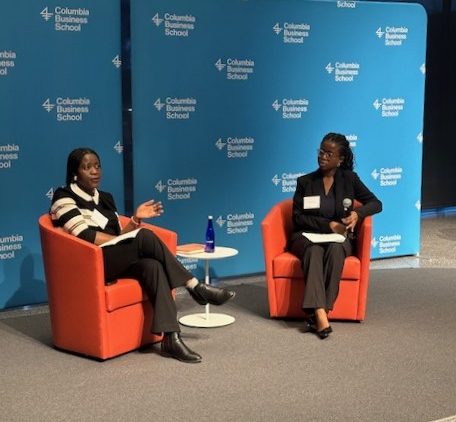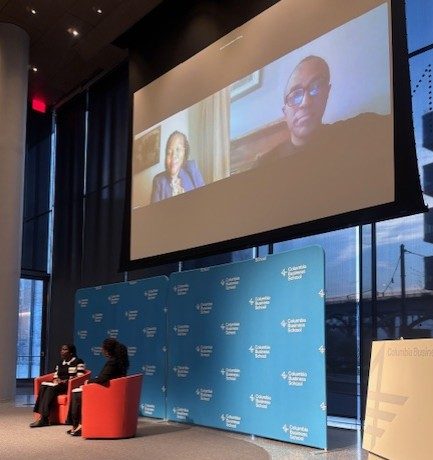This website uses cookies so that we can provide you with the best user experience possible. Cookie information is stored in your browser and performs functions such as recognising you when you return to our website and helping our team to understand which sections of the website you find most interesting and useful.
Vance Center Highlights Legal Career Pathways and Advocacy for Global Justice at Two NYC Law School Panels
April 2025Vance Center Africa Program Director Adaobi Egboka spoke on two panels in April exploring legal careers and the role of law in advancing justice around the world.

Vance Center Africa Program Director Adaobi Egboka joins CCALNY Co-Chair Gaëlle Alcindor at the event held at Columbia Business School on April 14, 2025. Photo credit: CCALNY
The two events underscored the transformative power of legal tools in advancing social change and highlighted how cross-border collaboration can expand opportunities for emerging legal leaders. From career development and mentorship to advocacy and activism, both discussions demonstrated that creative legal strategies, pro bono partnership, and community engagement are essential to advancing global justice – approaches that are central to the Vance Center’s mission.
Panel 1: Pathways to Practice: Navigating a Career in International Law with the Fordham International Law Association
On April 7, Vance Center Africa Program Director Adaobi Egboka joined a panel of practitioners at the Fordham University School of Law for a session hosted by the Fordham International Law Association (FILA), “Pathways to Practice: Navigating a Career in International Law.”
Moderated by FILA President Emily Jones, the panel also featured Beatrice Walton, associate at Debevoise & Plimpton and former judicial fellow at the International Court of Justice; and Sara Lucía Dangón-Novoa, an attorney at Curtis, Mallet-Prevost, Colt & Mosle LLP.
Egboka shared about her professional journey in international law, from early-career legal work in Nigeria’s human rights space to leading the Vance Center’s Africa Program. She highlighted core Vance Center initiatives – including the African Legal Fellows Program, Access to Justice Practicum, and Advancing Women in the Workplace (AWW) mentorship program – that create meaningful pathways for young lawyers through mentorship, training, and pro bono engagement. In her remarks, she emphasized the importance of adaptability and persistence in the evolving international law landscape and the global partnerships that enabled her success.
The other panelists offered insights on varied paths to impactful work in international law. Dangón-Novoa spoke about her transition from government service to private practice, sharing how experiences such as the Philip C. Jessup Moot Court Competition, the Hague Academy of International Law, and practicing law on energy sector matters at a local firm helped shape her professional growth and deepen her understanding of the field.
Panel 2: Advocacy and Activism: Law as a Tool for Social Change in the Diaspora with Columbia Law School’s Connecting Caribbean and African Lawyers of New York Initiative
The next week, Egboka joined a panel at the 2025 Connecting Caribbean and African Lawyers of New York (CCLANY) Spring Conference, held at Columbia Business School. The student-led initiative, which is dedicated to uplifting the experiences of African and Caribbean students and lawyers, focused this year’s event on “Advocacy, Leadership, and Innovation: Empowering the Next Generation of Legal Trailblazers in the Diaspora.”

Vance Center Africa Program Director Adaobi Egboka (left) with CCALNY Co-Chair Gaëlle Alcindor and virtual panelists Associate Professor Dr. Catherine S. Namakula and human rights lawyer Maurice Tomlinson at the event Columbia Business School, April 14, 2025. Photo credit: CCALNY
Egboka participated in the panel “Advocacy and Activism: Law as a Tool for Social Change in the Diaspora,” alongside Dr. Catherine S. Namakula, Associate Professor at the University of the Free State in South Africa and convenor of the University’s Africa Reparation Hub, and Maurice Tomlinson, a Jamaican human rights lawyer and global LGBTQ+ rights advocate. The discussion was moderated by CCALNY Co-Chair Gaëlle Alcindor and featured a keynote address by Transformative Justice Coalition Founder and President Barbara Arnwine, who centered her remarks on civil rights, the rule of law, and the critical role lawyers play in mobilizing for justice.
Drawing on her work leading the Vance Center’s partnerships with lawyers and civil society groups across sub-Saharan Africa, Egboka shared strategies for using litigation and legal reform to drive social change in the region. She emphasized the importance of clearly framing legal issues, building credible coalitions that reflect diverse perspectives, and leveraging the power of a collective voice to elevate underrepresented causes. She highlighted the critical role of the Vance Center’s pro bono partnerships, which provide high-quality legal support to under-resourced and equity-focused legal movements, in propelling systemic change.
Egboka also pointed to the role of media in these efforts. She discussed the power of media to amplify messages and to shape narratives and underscored the need to center the voices of affected individuals and communities to make the human impact of legal work visible and compelling. Her remarks illustrated how legal tools, when combined with pro bono collaboration and community engagement, can powerfully address urgent social challenges.
Tomlinson shared insights from his work challenging anti-LGBTQ+ laws before Caribbean courts and international tribunals, while Namakula spoke about her role on the United Nations Working Group of Experts on People of African Descent and her efforts to address racial injustice on a global scale. The panel concluded with a candid conversation about the personal demands of advocacy work and the importance of finding balance and support to prevent burnout while engaging in cross-border legal efforts.
Since CCALNY launched in 2023, the Spring Conference has become a platform for international legal dialogue focused on strengthening the legal network of the Black diaspora, celebrating the culture of Africa and the Caribbean, and spotlighting legal work in these regions. The initiative has brought together speakers with expertise across sectors and drawing attendees from more than 30 countries, eight law schools, and a range of fields, including public interest, corporate law, and government service.


